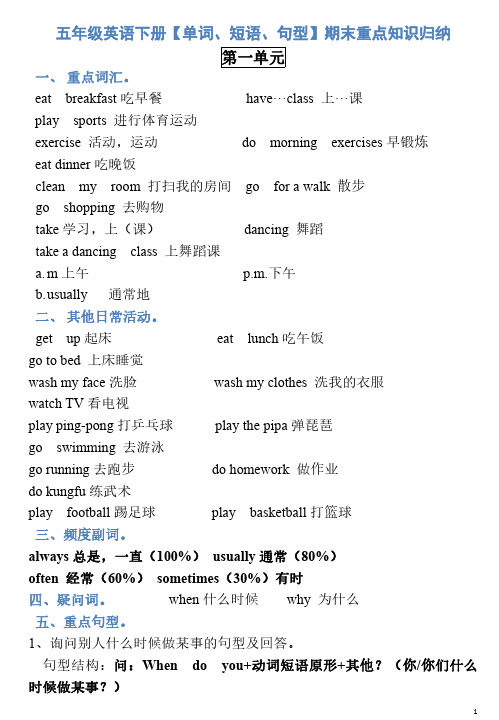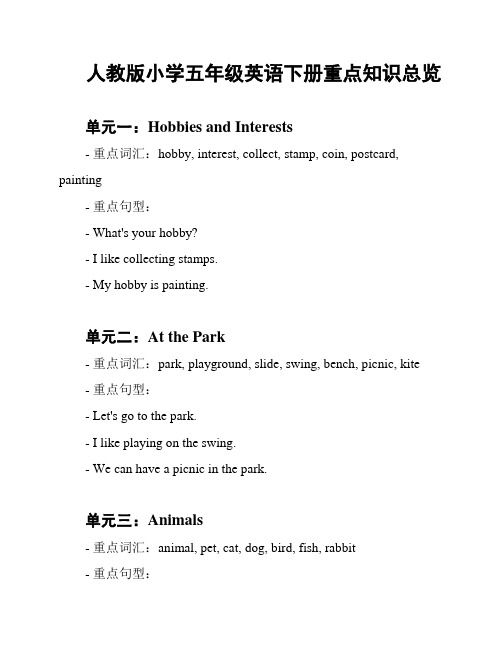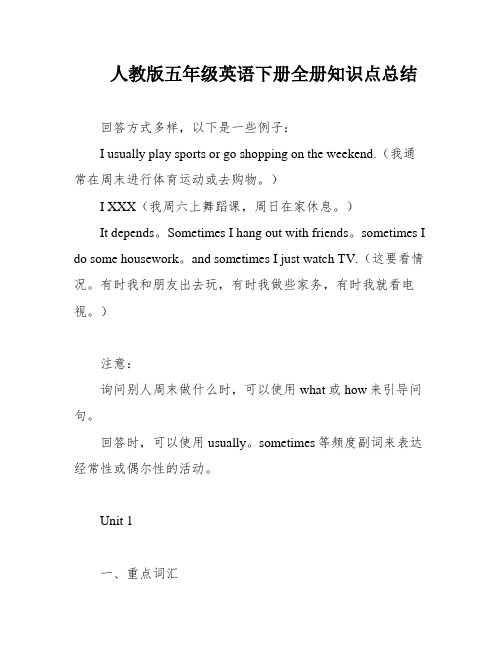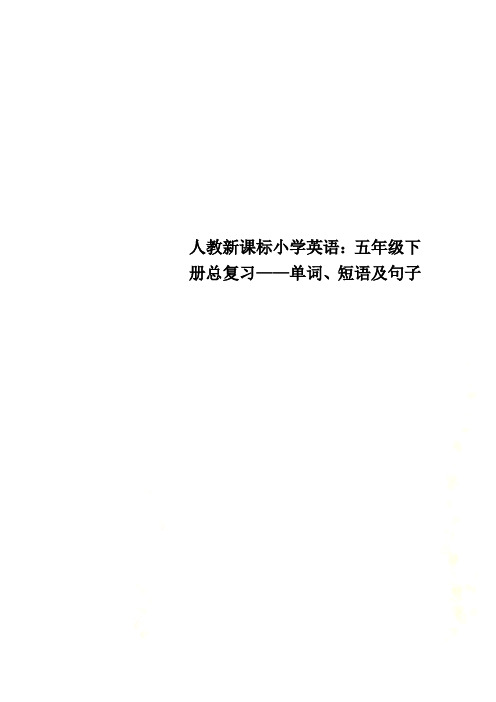人教新课标小学英语:五年级下册总复习——单词、短语及句子
人教版英语小学五年级下册【单词、短语、句型】期末重点知识归纳

五年级英语下册【单词、短语、句型】期末重点知识归纳一、重点词汇。
eat breakfast吃早餐have···class上···课play sports进行体育运动exercise活动,运动do morning exercises早锻炼eat dinner吃晚饭clean my room打扫我的房间go for a walk散步go shopping去购物take学习,上(课)dancing舞蹈take a dancing class上舞蹈课a.m上午p.m.下午ually通常地二、其他日常活动。
get up起床eat lunch吃午饭go to bed上床睡觉wash my face洗脸wash my clothes洗我的衣服watch TV看电视play ping-pong打乒乓球play the pipa弹琵琶go swimming去游泳go running去跑步do homework做作业do kungfu练武术play football踢足球play basketball打篮球三、频度副词。
always总是,一直(100%)usually通常(80%)often经常(60%)sometimes(30%)有时四、疑问词。
when什么时候why为什么五、重点句型。
1、询问别人什么时候做某事的句型及回答。
句型结构:问:When do you+动词短语原形+其他?(你/你们什么时候做某事?)答:I/we(+频度副词)+动词短语原形+at+具体时间(我/我们通常在几点做某事。
)例:问:When do you go to bed?(你什么时候上床睡觉?)答:I go to bed at9:00p.m(我晚上9点上床睡觉。
)注意:当主语是第三人称单数(he,she,it,单个人名或单数名词)时,助动词do要变成does,句型结构是:when does+主语(第三人称单数)+动词短语原形+其他?2、询问别人周末做什么的句型及回答。
五年级英语下册『重点单词、词组、句型』期末复习

五年级下册英语『重点单词、词组、句型』期末复习Unit 1重点单词、词组和句型重点单词、词组:Winter vacation visit the GreatWallgo toAustraliavisit themuseumwatch TV寒假参观长城去澳大利亚参观博物馆看电视Sun Moon Lake Play chess Play theviolinPlay football Playbasketball日月潭下象棋拉小提琴踢足球打篮球Dohomeworkhometown Australia The UK The USA 做作业家乡澳大利亚英国美国动词原形Am/is are do go take play watch visit 过去式was were did went took played watched visited中文意思是是做去拿,带打,玩观看参观重点句子:1.How was your winter vacation? 你的寒假过得怎样?2.It was wonderful. 好极了。
3.I visited the Great Wall.我去参观了长城。
Unit 2重点单词、词组和句型重点单词、词组:elephant bear tiger monkey panda lion sheep horse 大象熊老虎猴子熊猫狮子绵羊马pig cow cat dog bird fish hen chicken 猪奶牛猫狗小鸟鱼母鸡鸡in on under next to overtherebehind beside在……里面在……上面在……下面在……隔壁在那在……后面在……旁边重点句型:1.There is a map over there.那有一幅地图。
There are some elephants behind the hill.小山后面有一些大象。
There is/are表示某个地方有……,当后面的事物为单数时,用is;当后面的事物为复数时用are.2.What animals did you see?你看到了什么动物?We saw tigers and elephants.我们看了老虎和大象。
人教版小学五年级英语下册知识点汇总(完整版)

Unit1 My day 知识点总结一、语音cl — [cl] : clean classpl — [pl] : eggplant茄子 please play注意:cl 和 pl 放在词尾与 e 结合变为cle 和 ple 时发音不同.如people,apple。
二、词汇1、日常活动词汇do morning exercises(做早操)eat breakfast/lunch/dinner(吃早餐/午餐/晚餐)have...class(上…课)take a dancing class(上舞蹈课)play sports(做运动)go for a walk (散步)clean my room(打扫我的房间)go shopping(购物)2、其他词汇exercise 活动;运动 take学习;上(课)dancing跳舞;舞蹈when什么时候;何时 after在(时间)后 start开始(反义对应词finish完成)usually 通常地;惯常地 Spain 西班牙 late 晚;迟(反义对应词early早)why 为什么 a.m.午前;上午 p.m.午后;下午 shop去买东西;购物work 工作 last上一个的;刚过去的 sound听起来好像also 还;也busy 忙的need 需要play 戏剧剧本 letter 信Live 居住island 岛always 总是;一直 cave 山洞;洞穴go swimming 去游泳win 获胜。
三、句型以及语法知识点1、询问别人什么时候做某事某种活动的when特殊疑问句型,使用时间短语回答。
When do you do morning exercises? 你何时做早操?I do morning exercises at 7:00.我七点钟做早操。
When do you finish class in the morning? 你们上午的课到什么时候结束?We finish class at 1 o’clock.我们一点钟结束上午的课。
小学英语短语人教版五年级下册短语

小学英语短语:人教版五年级下册短语以下是整理的“小学英语短语:人教版五年级下册短语”内容,供大家参考学习,希望大家可以仔细阅读。
若想了解更多“小学英语短语”的相关内容,可以关注,小编会持续为大家更新。
Unit1many years ago 许多年前every day 每天talk to us 和我们谈话talk about her life 谈论她的生活lots of 许多a TV program 一个电视节目watch TV 看电视last night 昨晚cook on fire 用炉火做饭work in the fields 在田里工作in England 在英国Unit2three years ago 三年前teach Chinese 教语文walk to school 步行去学校write letters 写信study hard 努力学习send an email 发送电子邮件a good pupil 一个好学生by school bus 乘坐校车learn English 学英语Unit3fish and chips 鱼和薯条at school 在学校have dinner 吃晚饭a traditional English dinner 一顿传统的英式晚餐English food 英国饭have sandwiches 吃三明治have breakfast 吃早饭have lunch 吃午饭Unit4excuse me 打扰一下in two weeks’time 在两周内library card 图书卡on Shelf C 在C架上a book about computers 一本关于电脑的书be good at 擅长find out 找到train information 火车信息Chinese food 中国菜want to know 想知道on the CD-ROM 在只读光盘上in the timetable 在时刻表说Chinese words 汉语词语in the dictionary 在字典里in the newspaper 在报纸上in the library 在图书馆里at the zoo 在动物园里on TV 在电视上bring back 带回来make an e-card for 为…制作电子贺卡Unit5look at 看take…to China 把…带到中国be easy for 对…容易a blue T- shirt 一件蓝色的体恤衫two pockets 两个口袋four wheels 四个轮子Unit6of course 当然in the west of China 在中国的西部in the north of China 在中国的北部ride a horse 骑马last year 去年in July 在七月my uncle 我的叔叔every year 每年some photos of China 一些中国的照片climb the Tianshan Mountain 爬天山Unit7at work 在工作send an email 发电子邮件another computer 另一台电脑write a message 写信息a computer message 一条电脑信息work very hard 工作很努力from…to …从…到…at the office 在办公室a good idea 好主意at four o’clock在四点click on 点击dad’s computer 爸爸的电脑Unit8on the phone 在电话里in the summer 在夏天give him a kite 给他一个风筝how about 关于…怎么样come quickly 快过来a dragon kite 一个龙风筝on the tree 在树上the same as 与…一样Unit9have got 拥有two letters in English 两封用英语写的信go to a children’s theatre 去儿童剧院wear men’s clothes 穿男人的衣服laugh a lot 大笑told lots of jokes 讲了许多笑话after the show 演出之后in three weeks 在三周之内Chinese history 中国历史in the evening 在晚上borrow a bike for you 给你借了一辆自行车Unit10at the airport 在机场make a list 列清单go to the airport 去机场tomorrow morning 明早in New York 在纽约a yellow taxi 一辆黄色的出租车tall building 高楼大厦speak English 讲英语make Chinese food for me 为我做中国食物try American food 尝美国食物write again 再回信。
人教版小学五年级英语下册重点知识总览

人教版小学五年级英语下册重点知识总览单元一:Hobbies and Interests- 重点词汇:hobby, interest, collect, stamp, coin, postcard, painting- 重点句型:- What's your hobby?- I like collecting stamps.- My hobby is painting.单元二:At the Park- 重点词汇:park, playground, slide, swing, bench, picnic, kite- 重点句型:- Let's go to the park.- I like playing on the swing.- We can have a picnic in the park.单元三:Animals- 重点词汇:animal, pet, cat, dog, bird, fish, rabbit- 重点句型:- Do you have any pets?- I have a pet cat.- The bird is singing.单元四:Food and Drinks- 重点词汇:food, drink, apple, banana, orange, milk, water- 重点句型:- What's your favorite food?- I like eating apples.- Can I have some water?单元五:Weather and Seasons- 重点词汇:weather, sunny, cloudy, rainy, snowy, spring, summer, autumn, winter- 重点句型:- What's the weather like today?- It's sunny and warm.- I like playing in the snow.单元六:My Family- 重点词汇:family, father, mother, brother, sister, grandfather, grandmother- 重点句型:- How many people are there in your family?- I have one brother and one sister.- My grandparents live with us.单元七:School Life- 重点词汇:school, classroom, teacher, student, desk, chair, book, pen- 重点句型:- What's your favorite subject?- I like English.- We study at school.单元八:Sports and Activities- 重点词汇:sports, activity, football, basketball, volleyball, swimming, dancing- 重点句型:- Do you like sports?- Yes, I like playing football.- Let's go swimming together.单元九:Transportation- 重点词汇:transportation, car, bus, bicycle, taxi, train, subway - 重点句型:- How do you go to school?- I go to school by bus.- I want to take a train.单元十:Occupations- 重点词汇:occupation, doctor, teacher, nurse, firefighter, policeman, musician- 重点句型:- What do you want to be in the future?- I want to be a doctor.- My mom is a teacher.以上是人教版小学五年级英语下册的重点知识总览,希望对你有帮助!。
人教版小学五年级英语下册知识点归纳

人教版小学五年级英语下册知识点归纳五年级英语下册是小学阶段的最后一学期,学生们将进一步学习英语的语法、词汇和日常交际用语。
本文将对五年级英语下册的知识点进行归纳,以帮助学生更好地复习和掌握这些知识。
一、语法知识点1. 一般现在时:表示经常性的动作或习惯性的行为,结构为主语+动词原形。
例如:"She often goes to the park on weekends."2. 一般过去时:表示过去发生的动作或状态,结构为主语+动词过去式。
例如:"Yesterday, I played soccer with my friends."3. 现在进行时:表示现阶段正在进行的动作,结构为主语+be动词(am/is/are)+动词-ing形式。
例如:"They are watching a movie in the cinema."4. 一般将来时:表示将来要发生的动作或事件,结构为主语+will+动词原形。
例如:"I will visit my grandparents next week."5. 动词的-ing形式:表示正在进行的动作,或者作为主语、定语、表语、宾语补足语等。
例如:"I enjoy swimming in the summer."6. 动词的过去式:表示过去发生的动作或状态。
例如:"He ate an apple for breakfast."二、词汇知识点1. 数字:学习1-100的基本数字,以及基本的数学运算符号。
例如:"5 + 3 = 8."2. 季节和月份:学习四季和每个月份的英文表达,以及与之相关的天气和活动。
例如:"In winter, it often snows. We can go skiing."3. 食物:学习常见食物的英文表达,以及与之相关的问答句型。
最新人教版五年级英语下册全册知识点总结

最新人教版五年级英语下册全册知识点总结Unit 1一、重点词汇eat breakfast吃早餐have...class 上······课play sports 进行体育运动exercise 活动,运动do morning exercises做早操eat dinner吃晚饭clean my room 打扫我的房间go for a walk 散步go shopping 去购物take学习,上(课)dancing 舞蹈take a dancing class 上舞蹈课a.m.上午p.m.下午usually 通常地二、其他日常活动get up起床eat lunch吃午饭go to bed 上床睡觉wash my face洗脸wash my clothes 洗我的衣服watch TV看电视play ping-pong打乒乓球play the pipa弹琵琶go swimming 去游泳go running去跑步do homework 做作业do kungfu练武术play football踢足球play basketball打篮球三、语音cl→[cl] :clean clock class cleverpl→[pl] :plate eggplant please play注意:cl 和pl 放在词尾与e 结合变为cle 和ple 时发音不同。
四、频度副词always总是,一直(100%)usually通常(80%)often 经常(60%)sometimes有时(30%)五、疑问词why 为什么when 什么时候六、重点句型1.询问别人什么时候做某事的句型及回答。
句型结构:问:When do you+动词短语原形+其他?(你/你们什么时候做某事?)答:I/we(+频度副词)+动词短语原形+at+具体时间. (我/我们通常在几点做某事。
)例:When do you go to bed?(你什么时候上床睡觉?)I go to bed at 9:00 p.m. (我晚上九点上床睡觉。
人教人教版小学英语五年级下册默写单词表和句子

人教人教版小学英语五年级下册默写单词表和句子文档编制序号:[KK8UY-LL9IO69-TTO6M3-MTOL89-FTT688]Words in unit 1吃早饭上……课进行体育运动活动;运动早锻炼吃晚饭打扫我的房间散步去买东西;购物学习;上(课)跳舞;舞蹈上舞蹈课什么时候;何时在(时间)后开始通常地;惯常地西班牙晚;迟午前;上午午后;下午为什么去买东西;购物工作上一个的;刚过去的听起来好像还;也忙的需要戏剧;剧本信表示接受某事物的人居住岛总是,一直山洞;洞穴去游泳获胜Words in unit 2春天夏天秋天冬天季节野餐去野餐摘;采集摘苹果雪人堆雪人去游泳哪一个最好地雪做得好因为假期全,完全粉色;粉色的可爱的;美丽的叶子落下;【美】秋天用颜料绘画Words in unit 3一月二月三月四月五月六月七月八月九月十月十一月十二月种植比赛;竞赛年一些一些事情集会;开会t运动会复活节旅行国家的国庆日美国的感恩节圣诞节长城假日;节日游戏滚动寻找巧克力(用作儿语)兔子(尤用于请柬)请赐复在……之前Words in unit 4第二的第三的第四的第五的第十二的第二十的第二十一的第二十三的第三十的特别的;特殊的小猫日记仍然;依旧;还是声音;响声(尤指)噪音(某些动物的)浓密的软毛开着的行走Words in unit 5你(们)的他的她的他们的;她们的;它们的我们的(正在)攀登;攀爬(正在)吃(正在)玩耍(正在)喝(水)(正在)睡觉每一;各个其他的相互兴奋的;激动的像……那样Words in unit 6正在)早锻炼(正在)上课(正在)吃午饭(正在)看书(正在)听音乐保持某种状态靠右保持你的课桌整洁小声讲话顺序按顺序来竹子它的;他的(指事物、动物或幼儿)引导;指引任何事物另外;其他展览说;讲看一看寿司教加拿大的西班牙的Unit 1你们上午的课几点结束?我们一点钟结束上午的课。
你周末做什么?我经常看电视,也常和我爸爸一起打乒乓球。
人教版小学五年级英语下册知识点总结和复习要点

人教版小学五年级英语下册知识点总结和复习要点一、词汇积累与运用1基础词汇熟练掌握课本中的基本词汇,包括名词、动词、形容词等。
如“season”(季节)、“spring”(春天)、“summer”(夏天)、“autumn”(秋天)、“winter”(冬天)等表示时间的词汇,以及“hobby”(爱好)、“swimming”(游泳)、“reading”(阅读)等描述活动的词汇。
例子:名词:flower(花)、tree(树)、bookstore(书店)。
动词:run(跑)、jump(跳)、swim(游泳)。
形容词:beautiful(美丽的)、happy(快乐的)、exciting (令人兴奋的)。
2短语与固定搭配学习并记忆课本中出现的常用短语和固定搭配,如“go shopping”(购物)、“play football”(踢足球)等。
理解并应用这些短语和固定搭配在句子中的位置和功能。
例子:固定搭配:do homework(做作业)、have lunch(吃午饭)、watch TV(看电视)。
二、句型学习与掌握1陈述句熟练掌握陈述句的基本结构和用法,能够准确表达事实、观点或描述情况。
注意主语、谓语和宾语的一致性和正确性。
例子:陈述句:I like reading books in my free time.(我空闲时喜欢读书。
)2疑问句学习并掌握特殊疑问句、一般疑问句及其回答方式。
能够根据问题提出合理的回答,并注意时态和语态的正确使用。
例子:特殊疑问句:What do you usually do on weekends?(你周末通常做什么?)回答:I usually go to the park with my family.(我通常和家人去公园。
)3祈使句学习祈使句的基本用法,能够正确使用祈使句表达请求、命令或建议。
注意祈使句中的动词形式和语气表达。
例子:祈使句:Please don’t forget to bring your homework tomorrow.(请别忘了明天带作业来。
人教版五年级英语下册全册知识点总结

人教版五年级英语下册全册知识点总结回答方式多样,以下是一些例子:I usually play sports or go shopping on the weekend.(我通常在周末进行体育运动或去购物。
)I XXX(我周六上舞蹈课,周日在家休息。
)It depends。
Sometimes I hang out with friends。
sometimes I do some housework。
and sometimes I just watch TV.(这要看情况。
有时我和朋友出去玩,有时我做些家务,有时我就看电视。
)注意:询问别人周末做什么时,可以使用what或how来引导问句。
回答时,可以使用usually。
sometimes等频度副词来表达经常性或偶尔性的活动。
Unit 1一、重点词汇吃早餐:eat breakfast 上······课:have。
class进行体育运动:play sports做早操:do morning exercises 打扫我的房间:clean my room 去购物:go shopping舞蹈:dancing上午:a.m.通常地:usually二、其他日常活动起床:get up上床睡觉:go to bed活动,运动:exercise吃晚饭:eat XXX散步:go for a walk研究,上(课):XXX上舞蹈课:take a dancing class下午:p.m.吃午饭:eat XXX洗脸:XXX洗我的衣服:XXX看电视:watch TV打乒乓球:play ping-pong弹琵琶:play the pipa去游泳:go swimming去跑步:go running做作业:do homework练武术:do XXX踢足球:play football打篮球:play basketball三、语音cl→ [cl]:clean。
人教新课标小学英语:五年级下册总复习——单词、短语及句子

人教新课标小学英语:五年级下册总复习——单词、短语及句子五年级英语下册总复习Unit 1Draw a cat on the roof.A roof屋顶 A chimney烟囱above the tree在树的上方in front of the car在小车的前方on the roof在屋顶上above the chimney在烟囱上方behind the tree在树后面on the tree在树上in the grass在草中Unit 2 Don’t put your feet on the seat .单词:a rubbish bin垃圾桶 a cup of tea一杯茶put 放a seat一个座位spill泼,撒sugar糖cafe咖啡don’t 不要句子:Don’t put your feet on the seatDon’t put your hand in the rubbish bin。
不要把手放在垃圾箱里。
Don’t spill the sugar on the table。
不要把糖撒在桌上。
Don’t read in bed。
不要躺在床上看书。
Don’t talk in class。
上课不要交谈。
Don’t play on the road。
不要在公路上玩耍。
Don’t pick flowers。
不要摘花。
Unit 3 There is a policeman near the post office.A raod 一条路 A street 一条街a corner 一Sports Day 体育节a one-hundred meter race 100米赛跑last 最后的句子:Who was first? 谁是第一?Peter was first. 彼得是第一。
Who was last? 谁是最后?The rabbit was last.兔子是最后。
Unit 6 Was it in the wardrobe?单词:near……靠近……near the sofa 靠近沙发beside……在……旁边beside a lamp 在灯旁边 a ring 戒指ontop of ……在……的顶上Look for……寻找……in……在……里面on……在……上面under……在……下面inside 在……里边out 在……外边句子:Was it beside the lamp? No, it wasn’t.它是在灯旁边吗?不,不是的Was it near the sofa? No, it wasn’t.它是在沙发附近吗?不,不是的Was it on the television? Yes, it was.它是在电视机上吗?对,是的Unit 7 When is your birthday?单词:January 一月February 二月March 三月April 四月May五月June 六月July七月August 八月September 九月October 十月November 十一月December 十二月句子:When is your birthday? 什么时候是你的生日?It’s on the fifth of March.是在三月五号。
小学英语人教PEP五年级下册《重点词汇句型》整理(直接打印每生一份熟记)

五年级英语下册重点词汇句型整理Unit 1【重点单词】do morning exercises 晨练eat breakfast 吃早饭have English class 上英语课play sports 进行体育运动eat dinner 吃晚饭when 什么时候evening 夜晚;晚上get up 起床at 在……点钟usually 通常;一般noon 中午climb mountains 爬山go shopping 购物;买东西play the piano 弹钢琴visit grandparents 看望祖父母go hiking 去远足weekend 周末often 经常sometimes 有时候【重点句型表达】When do you finish class in the morning?你们上午的课到几点结束?We finish class at 1 o'clock.我们一点钟结束上午的课。
What do you do on the weekend?你周末做什么?I often watch TV and play ping-pong with my father. 我经常看电视,也常和我爸爸一起打乒乓球。
Unit 2【重点单词】spring 春天summer 夏天fall 秋天winter 冬天season 季节which 哪一个best 最;极swim 游泳fly kites 放风筝skate 滑冰;滑冰鞋make a snowman 堆雪人plant trees 种树why 为什么because 因为sleep 睡觉【重点句型表达】Which season do you like best,Mike?迈克,你最喜欢哪个季节?Winter. 冬天。
Why?为什么?Because I like summer vacation!因为我喜欢暑假!Unit 3【重点单词】Jan. / January 一月Feb. / February 二月Mar. / March 三月Apr. / April 四月May 五月June 六月July 七月Aug. / August 八月Sept. / September 九月Oct. / October 十月Nov. / November 十一月Dec. / December 十二月birthday 生日uncle 叔叔;舅舅her 她的date 日期1【重点句型表达】When is the party? 聚会什么时候举行?It’s in April.在4月。
新人教版五年级下册英语知识点汇总

五年级下册英语第一单元知识点整理1、主要单词和短语:do morning exercises 晨练,做早操eat breakfast 吃早饭have En glish class 上英语课eat dinner 吃晚饭play sports 进行体育活动eat lunch 吃午饭climb mountains 爬山go shopp ing 购物,买东西play the pia no 弹钢琴visit gran dpare nts 看望(外)祖父母go hiki ng 去远足二、主要句子:Whe n do you eat dinner? 你什么时候吃晚饭? 1 eat dinn er at 7:00 in the evening我晚上七点吃晚饭。
Whe n do you get up? 你什么时候起床?I usually get up at 12:00 at noon. 我通常在中午12点起床。
What do you do on the weeke nd? 你在周末干什么?Usually I watch TV and go shopp ing. 我通常看电视和购物。
I ofte n play football. 我经常踢足球。
Sometimes I go hiki ng. 有时候我去远足。
三、重要知识点同义词:eat breakfast-havebreakfast , eat lun ch-have lun ch, eat dinn er-have dinner play sports-do sports, usually-ofte n复数形式:policema n-policeme n policewoma n-policewome n现在分词:tell-telli ng第三人称单数:say-says同义句:What do you do ? ---What are you? 你是干什么的?表示频度的副词:always总是,一直;usually通常,常常;often 经常; sometimes有时候以复数形式出现的词组:visit gran dpare nts ,pla nt trees介词后跟表示时间的词语时,表示在某年、某月]、某个季节,某个时候(在上午,在下午,在晚上)用in;表示在某天,在星期几用on,在具体的几点几分用at.too和either的用法区别:too和either都是也的意思,但too用于肯定句,either用于否定句。
人教版五年级的下册的英语重要单词和句型.doc

Unit1 This is My Day一、重点单词:do morning exercises eat breakfast have English class play sportseat dinner when evening usually noon weekend go shopping play the piano sometimesget up atoften climb mountains visit grandparents go hiking二、重点句型:1. —— When do you do morning exercises?—— I usually do morning exercises at 8:30.2. —— When do you eat lunch?—— I eat lunch at noon.。
3.—— What do you do on the weekend?—— What do you do on weekends?4. —— I can't go to play football in the rain. I can’ t go hiking ,either .Unit 2 My Favourite Season一、单词:spring summer fall winter season which best swim fly kitesskate make a snowman plant trees why becausesleepplay with always leaf( 复数 leaves) snow up north二、句子1. 一 What's your favourite season?一Winter.2. — Which season do you like best? ---- I like summer best.3. —— Why do you like summer?——Because l can swim in the lake —— Why do you like winter?——Because l can sleep a long time ..Unit 3 My Birthday一、单词:January(Jan. )February(Feb.) March(Mar.)April(August( Aug.)September(Sept.)October(Oct.)November(Nov.) December (Dec.) first second thirdfourth fifth eighth ninth twelfth twentiethbirthday uncle her dateApr.)二、句型:1. When is your birthday? 一 My birthday is in June .2. How many birthdays are there in January? —— There are ⋯3. Is your birthday in February , too? —— Yes, it is.4. Who has a birthday in October?5. What's the date today? —— It ’ April 14 th .Unit 4 What are you doing?一、单词: draw pictures cook inner read books answer the phonelisten to music clean the room write a letter write an E-mail grandpa study talk Children's Center see you laterspeak to hold on call二、句型1. W hat are you doing? 一 I am doing the dishes .2. This is Chen Jie =It ’s Chen Jie.3. What is your father doing? 一 He's writing an e-mail in the study .4. C an l speak to your mom , please?5. P lease hold on .6. T here is a call for you .7. G randpa is writing a letter .Brother is doing homework .Mom is cooking dinner in the kitchen .Unit 5 Look at the Monkeys一、单词 fly jump walk run swim kangaroo sleepclimb fight swing drink water trunk climber二、句型1. Look at the tiger .2. I see the mother elephant .3. Do you see any elephants?4. What is it doing? —— It ’ s walking.5. What are they doing? 一 They are drinking water.Unit 6 A Field Trip一、单词: take pictures watch insects pick up leaves do anexperiment catch butterflies count insects collect leaves write a report play chess have a picnic honeyhave a look woods ant interesting thing himleave us over there1. What is he doing? 一 He's watching insects .2. Are they catching butterflies? —— Yes, they are .∕ No,they aren't .3. Are you eating lunch? Yes , we are .No, we aren't .4. What experiment? 一 What do ants like to eat?5. Is he taking pictures? —— Yes,he is .∕ No, he isn't .6. 一 Is she counting insects?——Yes,she is.∕ No,she isn’ t.。
人教版五年级下册英语知识点整理

五年级下册英语第一单元知识点整理1、主要单词和短语:do morning exercises 晨练,做早操eat breakfast 吃早饭have English class 上英语课eat dinner 吃晚饭play sports 进行体育活动eat lunch 吃午饭(climb mountains 爬山go shopping 购物,买东西play the piano 弹钢琴visit grandparents 看望(外)祖父母go hiking 去远足二、主要句子:When do you eat dinner 你什么时候吃晚饭I eat dinner at 7:00 in the evening. 我晚上七点吃晚饭。
@When do you get up 你什么时候起床I usually get up at 12:00 at noon. 我通常在中午12点起床。
What do you do on the weekend 你在周末干什么Usually I watch TV and go shopping. 我通常看电视和购物。
Sometimes I visit my grandparents. 有时候我去看望我的外祖父母。
I often play football. 我经常踢足球。
Sometimes I go hiking. 有时候我去远足。
三、重要知识点》同义词:eat breakfast-have breakfast , eat lunch-have lunch, eat dinner-have dinner play sports-do sports, usually-often复数形式:policeman-policemen policewoman-policewomen现在分词:tell-telling第三人称单数:say-says同义句:What do you do ---What are you 你是干什么的表示频度的副词:always 总是,一直;usually 通常,常常;often 经常;sometimes 有时候以复数形式出现的词组:visit grandparents ,plant trees>介词后跟表示时间的词语时,表示在某年、某月、某个季节,某个时候(在上午,在下午,在晚上)用in;表示在某一天,在星期几用on,在具体的几点几分用at.too 和either的用法区别:too和either都是“也”的意思,但too用于肯定句,either用于否定句。
人教新课标五年级下册英语:词汇及句型汇总

人教新课标五年级下册英语:词汇及句型汇总Unit 1 Draw a cat on the roof. 在屋顶上画只猫。
词汇:roof屋顶chimney 烟囱tree树2) 方位介词:on 在……之上(接触)in 在……里面under在……下面above 在……上面(不接触)in front of 在……前面inside 在……里面outside 在…….别处behind在……后面Unit 2 Don’t put your feet on the seat.别把你的脚放在椅子上。
词汇:a cup of tea 一杯茶rubbish bin 垃圾桶cafe 咖啡店sugar 糖spill溢出来seat 座位naughty顽皮noisy吵闹的late迟的rude 粗鲁的pol ite 礼貌的Unit 3 There’s a policeman near the post office.邮局邻近有一个警察。
词汇:post office邮局corner角落road 公路street 街道shopping center购物中心句型:Is there anyone near the post office? 邮局邻近有人吗?确信回答:Yes,there is. 是的,有人。
否定回答:No, there isn’t. 不,没有。
Unit 4 Where were you, Mingming? 明明,你去哪里了?词汇:yesterday昨天today今天weekdays 在平日sick 生病railway station火车站hand in 交上句型:1)——Where were you? 你在哪?——I was in bed at home. 我在家卧床休息。
2)We went to the railway station to meet him.我们去火车站迎接他。
Unit 5 Who was first? 谁是第一?词汇:last 最后meter 米race 赛跑sports运动会first s econd third fourth fifthsixth seventh eighth ninth tenth句型:1)Who was first? Peter was first.2) There was a one hundred metre race.Unit 6 Was it in the wardrobe? 它在衣柜里吗?确信回答:Yes, it was. 是的,它在。
- 1、下载文档前请自行甄别文档内容的完整性,平台不提供额外的编辑、内容补充、找答案等附加服务。
- 2、"仅部分预览"的文档,不可在线预览部分如存在完整性等问题,可反馈申请退款(可完整预览的文档不适用该条件!)。
- 3、如文档侵犯您的权益,请联系客服反馈,我们会尽快为您处理(人工客服工作时间:9:00-18:30)。
五年级英语下册总复习Unit 1Draw a cat on the roof.A roof屋顶 A chimney烟囱above the tree在树的上方in front of the car在小车的前方on the roof在屋顶上above the chimney在烟囱上方behind the tree在树后面on the tree在树上in the grass在草中Unit 2 Don’t put your feet on the seat .单词:a rubbish bin垃圾桶 a cup of tea一杯茶put放a seat一个座位spill泼,撒sugar糖cafe咖啡don’t不要句子:Don’t put your feet on the seatDon’t put your hand in the rubbish bin。
不要把手放在垃圾箱里。
Don’t spill the sugar on the table。
不要把糖撒在桌上。
Don’t read in bed。
不要躺在床上看书。
Don’t talk in class。
上课不要交谈。
Don’t play on the road。
不要在公路上玩耍。
Don’t pick flowers。
不要摘花。
Unit 3 There is a policeman near the post office.A raod 一条路 A street 一条街a corner 一个角落A shopping center 一个购物中心Outside在……外面Post office 邮局in在……里面near 在……附近on在……上面under在……下面above在……上方inside在……里outside在……外边in front of在……前面Unit 4 Where were you ,Mingming ?单词:railway station 火车站hand in 交上yesterday 昨天today 今天sick 生病的weekdays 平日句子:Where were you on Sunday? 你星期日去哪儿了?I was sick .I was in bed at home. 我生病了。
我在家睡觉。
Unit 5 Who was first?单词:1st first 2nd second 3rd third4th fourth 5th fifth 6th sixth7th seventh 8th eighth 9th ninth 10th tenthSports Day 体育节a one-hundred meter race 100米赛跑last 最后的句子:Who was first? 谁是第一?Peter was first. 彼得是第一。
Who was last? 谁是最后?The rabbit was last. 兔子是最后。
Unit 6 Was it in the wardrobe?单词:near……靠近……near the sofa 靠近沙发beside……在……旁边beside a lamp 在灯旁边 a ring 戒指on top of ……在……的顶上Look for……寻找……in……在……里面on……在……上面under……在……下面inside 在……里边out在……外边句子:Was it beside the lamp? No, it wasn’t.它是在灯旁边吗?不,不是的Was it near the sofa? No, it wasn’t.它是在沙发附近吗?不,不是的Was it on the television? Yes, it was.它是在电视机上吗?对,是的Unit 7 When is your birthday?单词:January 一月February 二月March 三月April 四月May五月June 六月July七月August 八月September 九月October 十月November 十一月December 十二月句子:When is your birthday? 什么时候是你的生日?It’s on the fifth of March.是在三月五号。
It’s on the fourth of May. 是在五月四号Children’s Day is on the first of June. 儿童节是在六月一号。
Unit 8 That’s not mine!形容词性物主代词名词性物主代词My 我的mineYour 你的yoursHis 他的hisHer 她的hersOur 我们的oursYour 你们的yours •Their 他们的theirs1、These pictures are ours.These are our pictures.2、Is this yours?Is this your picture?3、That’s his picture.That picture is his.4、That’s not mine.That’s not my picture.5、That’s hers.That’s her picture.在下面横线上填入适当的单词。
These pictures are ______(我们的).These are _______(我们的)pictures.Is this picture ______(你的)?Is this ______ (你的)picture?That’s ______ (他的)picture.That picture is ______ (他的).That picture is not ______ (我的).That’s not _______ (我的)picture.That picture is ______(她的). That’s _____(她的)picture.Unit 9 Benny took my ball.单词:naughty 调皮的naughty boy调皮的男孩hit 击/打hit me打我sorry 对不起I’m sorry matter 事情what’s the matter?(发生了)什么事?each other 互相;彼此say sorry to each other.互相道歉动词原形与过去式:(1)Is 是was (2)am 是was (3)are 是were(4)see看见saw (5)take拿,拿走took(6)hit击中hit(7)do做did (8)throw抛;扔threw (9)eat吃ate句子:1、What did Linda do?琳达做了什么?She threw something.她扔了东西2、What did Benny do?本尼做了什么?He ate an ice-cream.他吃了冰激凌。
Unit 10 Where did you go?单词:enjoy 喜欢;享受enjoy your school outing 喜欢你们学校的出游Have lunch吃午饭Changsha Underwater world长沙海底世界Yuelu Academy岳麓书院zoo动物园Hunan Provincial Museum湖南省博物馆where 哪里动词原形与过去式go去went have有had is/am是was,are是were句子:1、Where did you go?你们去了哪里?We went to the Yuelu Mountain.我们去了岳麓山。
2、Where did Peter go?彼得去了哪里?He went to the post office. 他去了邮局。
3、What did you see? 你们看到了什么?We saw Changsha City. 我们看见了长沙城。
Unit 11 What time did you see him?单词:a strange man一个陌生男人a storeroom一间储存室steal偷 a television一台电视机have dinner吃晚餐have breakfast吃早餐get up起床go to school上学go home回家go to bed睡觉do your homework做家庭作业动词原形与过去时(1)steal偷stole(2)have dinner吃晚餐had dinner(3)have breakfast吃早餐had breakfast(4)get up起床(5)got upgo to school上学went to school(6)go home回家went home(7)go to bed睡觉went to bed (8)do homework做家庭作业did homework句子:1、What time did you have breakfast?你什么时候吃的早餐?I had breakfast at seven thirty.我在7:30吃的早餐。
2、Where did you see him. 你在哪里看见他的?I saw him in the playground.我在操场看到他的。
Unit 12 I came by plane.单词:summer camp夏令营how怎样come here来这里a taxi出租车 a subway地铁on foot步行by plane 乘飞机by taxi乘出租车by subway乘地铁by car乘小车by bus乘公共汽车句子:1、How did you go to work? 你怎样去上班?I went to work by car. 我做小汽车去上班。
2、How did you come here?你怎么样来这里的?I came here on foot. 我走路来的。
3、How did you go home?你怎么样回家的?I went home by train。
我坐火车回家。
小练笔一、选择正确的选项,补全单词。
( )1、w_sh A, a B, u C, e ( ) 2、_cc_dent A, a, a B, a, e C, a, i ( ) 3、b_ _ k A, a, n B, e, n C, u, n( ) 4、cl_ _ner A, e, e B, e, o C, e, a ( ) 5、m_ _ ntain A, o, u B, a, u C, e, u 二、根据中文意思,补全单词1, ta_i 出租车2, c_ _ 汽车3, br_sh 刷4,_ _t 美术课5, dr_ver司机三、按正确的书写格式抄写句子We went to the railway station to meet him.Was it in the wardrobe?四、读句子,把正确答案和相对应的句子连起来。
